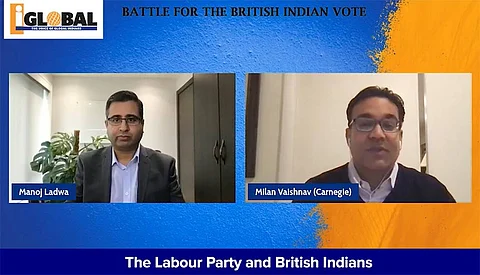

Why is the Labour Party losing its connect with British Indians? Is it too late to win back this crucial voter base? What’s behind the disaffection with a party traditionally seen as the natural home for British Indians?
These were just some of the themes and questions explored by India Inc. Founder & CEO and strategist Professor Manoj Ladwa in his exclusive conversation with Milan Vaishnav, Senior Fellow and Director of the South Asia Program at the Carnegie Endowment for International Peace. As the co-author of a definitive report on the subject, Vaishnav shed light on the issue for a live session entitled the Battle for the British Indian Vote.
MORE LIKE THIS…
Here are some excerpts from that exclusive session last month:
Could you help us define what swing voter is? And the big question is, could British Indians make such a big difference if an election was held tomorrow?
So, what we say in the report is that if a snap election were held tomorrow, British Indians could be important swing voters. Historically, British Indians have very much been core voters for the Labour Party. If you go back to 2010, 68 per cent of ethnic minorities voted for Labour, among them British Indians was at 61 per cent. So, a little bit lower than the average for all minorities, but still, six out of 10 British Indians vote for Labours is pretty strong for a group. We live in a very different era now, and I want to give you some numbers to think about.
If you look at the voters in our sample who have voted in 2015, who voted in 2019 and intend to vote in the next general election, 54 per cent of them voted for Labour in 2015, that share dipped to 46 per cent in 2019, and it's at 41 per cent today.
Another thing I would say is that you know there is the British election study which is one of the most revered election studies in the world. According to their observations between 2014 and 2020, you can see a steady decline in support again away from Labour, a modest plateauing in the Tories, and again a rise in the number of people who are just not sure.
And so, I think this is what makes us use the term swing voters because they are changing from one end to the other, but there is still a significant percentage whose votes are clearly up for grabs.
MORE LIKE THIS…
What are the main findings of your report?
This was a study that I conducted with the Devesh Kapur of Johns Hopkins University and my colleague Caroline Duckworth at Carnegie. And it's based on a nationally representative survey of about 800 British Indians we carried out back in August, 2021 with the research and polling form from YouGov. And to kind of put things in a nutshell, we find that while British Indians still demonstrate a modest preference for the Labour Party, that party's historical advantage has eroded. So if a fresh election were to be held, about four in 10 British Indians say that they identify with the Labour Party, a 3 and 10 support the Conservative Party, and around one in 10 identifies with smaller third parties.
And if you compare this to other benchmark data that we have, we can see that the association with Labour has declined. It's important to point out that a significant minority of British Indians, about 15 per cent in our survey, are undecided. And so, these are people who, in theory, could go either way - either to Labour or to Conservative or, in fact, further split the vote by supporting third parties. This has been bad news for Labour and good news for the Tories. Although I would inject a caveat here, if you look more closely at the data, you see that while the Conservatives initially gained as Labour went down, support for the Conservatives has plateaued. So you're starting to see more significant numbers of the diaspora don't know which side of the fence they're on.
MORE LIKE THIS…
Why did you find the need to do this report now?
Indians now make up between 2 1/2 to 3 per cent of the UK population. If you rewind the clock, say six decades ago, India was the third most common country of birth for people born outside the UK. By 2011 it has become the most common. So as their numbers and demographic weight have grown, so too has the community's political stature. And we have seen the community's political leanings are shifting away from the Labour and in favour of the Tories. And so, we wanted to ask just a series of straightforward questions - Where do British Indians' partisan leanings reside today? How does the diaspora view Britain's current political leadership?
MORE LIKE THIS…
Is it a myth that there's a swing away from Left leaning politics towards the right as one gets older?
No, I think that there's something to that. But what we know from studies is that people are politically socialised. Those people who are being born and raised in the UK to Labour households or who become Labour because of the influence of university or schools or their communities does tend to stay with them over time. On the contrary, people who are coming from India or from overseas have become politically socialised elsewhere. So I would insert a bit of caution into the Tory narrative. There is something to be very concerned about why they're not being able to win over the votes of those youngsters who are under the age of 30.
*Watch the full show here